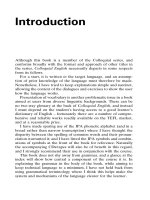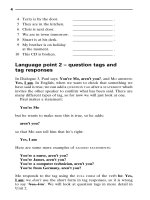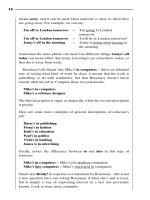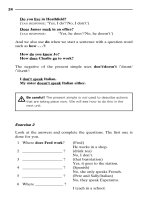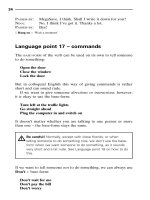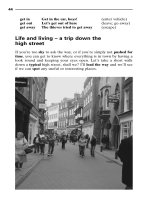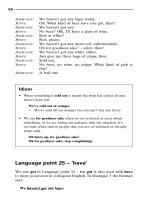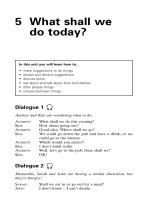A complete English language course part 5
Bạn đang xem bản rút gọn của tài liệu. Xem và tải ngay bản đầy đủ của tài liệu tại đây (359.35 KB, 10 trang )
Do you live in Heathfield?
(
TAG RESPONSE
: ‘Yes, I do’/‘No, I don’t’)
Does
James work in an office?
(
TAG RESPONSE
: ‘Yes, he does’/‘No, he doesn’t’)
And we also use do when we start a sentence with a question word
such as how . . . ?:
How do
you know Jo?
How does
Charlie go to work?
The negative of the present simple uses don’t/doesn’t /`dəυnt/
/`dznt/:
I don’t speak
Italian.
My sister doesn’t speak
Italian either.
Exercise 2
Look at the answers and complete the questions. The first one is
done for you.
1 Where does Fred work? (Fred)
He works in a shop.
2 ____________________ ? (drink tea)
No, I don’t.
3 ____________________ ? (that bus/station)
Yes, it goes to the station.
4 ____________________ ? (Spanish)
No, she only speaks French.
5 ____________________ ? (Pete and Sally/Italian)
No, they speak Esperanto.
6 Where ______________ ?
I teach in a school.
24
Be careful! The present simple is not used to describe actions
that are taking place now. We will see how to do this in the
next unit.
ƽ
7 Where ______________ ? (this bus)
It goes to the town centre.
8 ____________________ ? (Su/nearby)
Yes, she lives next door.
9 When _______________ ? (Mick and Sandra)
They leave at nine o’clock.
10 When _______________ ? (the post)
It arrives early in the morning.
Exercise 3
Here are some things Stephen and his friends do and don’t do.
Complete the sentences using the information from the box.
1 [+] Stephen speaks Russian
2 [–] Oliver ___________
3 [–] James ___________
4 [+] Jenny ___________
5 [–] Stephen ___________
6 [–] Jenny ___________
7 [+] James ___________
8 [+] Oliver ___________
1111
2
3
4
5
6
7
8
9
10
11
1211
13
14
15
16
17
18
19
20
21
22
23
24
25
26
27
28
29
30
31
32
33
34
35
36
37
38
39
40
41
4211
25
does [+] doesn’t do [–]
Stephen speak Russian play the piano
James drink coffee speak Russian
Oliver wear glasses drink coffee
Jenny play the piano wear glasses
Dialogue 5
Chris and Julie are looking through Chris’s family photos.
J
ULIE
: That’s your brother Dave, isn’t it?
C
HRIS
: Yes, it is.
J
ULIE
: And who’s that with him?
C
HRIS
: That’s his wife. She’s called Debbie, and she’s from
Australia.
J
ULIE
: Do they live here?
C
HRIS
: No, they live in Australia – in Sydney. He’s a lorry
driver, and she’s a nurse.
J
ULIE
: Do they both work in Sydney?
C
HRIS
: No – Debbie works in one of the hospitals, but Dave
drives all over the country.
J
ULIE
: Have they got any children?
C
HRIS
: Two boys.
[Julie turns the page] Here they are – Simon and James.
J
ULIE
: How handsome they are!
C
HRIS
: Thank you!
Language point 13 – weak forms
A number of very common short words in English have two pronun-
ciations: a
FULL PRONUNCIATION
when they are given special
emphasis, and a more common
WEAK PRONUNCIATION
otherwise.
Here are some that we have had already – if you have the cassettes/
CDs, listen again to the Dialogues we have had so far and see if you
can hear the weak pronunciations.
Full Weak
the /ði/ /ð/, /ðə/
to /tu/ /tə/
at /t/ /ət/
for /fɔ
r
/ /fə/
and /nd/ /ən(d)/
do /du/ /də/
or /ɔ
r
/ /ə/
of /ɔv/ /əv/
your /jɔ
r
/ /jə
r
/
him /hm/ /m/
her /hε
r
//ə
r
/
from /frɔm/ /frəm/
26
Dialogue 6
Two people meet one morning in a crowded café in London.
A
NDY
: Do you mind if I sit here?
B
ETH
: Not at all.
A
NDY
: It’s busy in here, isn’t it?
B
ETH
: It’s always like this in the mornings.
A
NDY
: Do you live round here?
B
ETH
: No – I live a few miles away. But I work just round the
corner. What about you?
A
NDY
: I’m visiting friends for the day.
B
ETH
: Where do you come from, then?
A
NDY
: From Bristol. But I live in Cambridge now, because that’s
where I work.
B
ETH
: So what do you do?
A
NDY
: I’m a doctor. What about you?
B
ETH
: I work for a publisher’s.
1111
2
3
4
5
6
7
8
9
10
11
1211
13
14
15
16
17
18
19
20
21
22
23
24
25
26
27
28
29
30
31
32
33
34
35
36
37
38
39
40
41
4211
27
Language point 14 – forms of the verb
There are five main forms of the verb in English – let’s look at them
quickly, using an ordinary
REGULAR VERB
, talk:
BASE
-
FORM
talk – this is the simplest form of the verb, with
no endings added
S
-
FORM
talks
ING
-
FORM
talking
ED
-
FORM
talked
TO
-
FORM
to talk – this is the same as the base-form, but
with to in front
However, a lot of common verbs in English are
IRREGULAR
in the
ED
-
FORM
(for example, speak changes to spoke, not ‘speaked’), and
there are spelling rules as well (for example, stop, but stopping not
‘stoping
’).
We will deal with all these things as the course goes on – all you
have to do for now is remember the names of the forms and what
they look like with a regular verb.
In this unit we have seen the base-form and the
S
-
FORM
. We saw
that the s-form is used in the
PRESENT SIMPLE
in the third person
singular, but that otherwise the present simple is the same as the
base-form; and we saw Andy in Dialogue 6 use the base-form after
Do you mind if I . . . ?
In the next unit we will look at the
ING
-
FORM
.
Dialogue 7
Jane brings the coffees over – but she can’t remember who ordered
what.
J
ANE
: Here we are, then. Now . . . whose is the latte?
F
RED
: That’s mine.
J
ANE
: And the cappuccino is yours, Su, isn’t it?
S
U
: No, that’s mine there – the mocha.
J
ANE
: Right. And mine is the Americano, so the espresso is
yours, Rod.
R
OD
: That’s right. Now . . . where’s the sugar?
28

